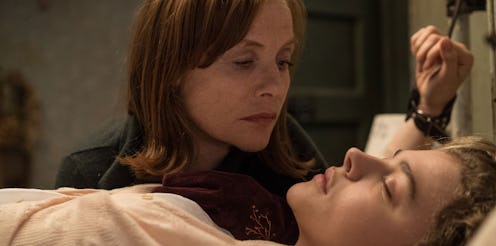Entertainment
This New Thriller Will Have You Questioning The Kindness Of Strangers

A lost purse is a breadcrumb leading a young woman into welcome new friendship, but the relationship soon turns into something much darker in Neil Jordan's latest movie Greta, opening Mar. 1. With its Hansel-and-Gretel style cottage and young women in peril, it's something of a fractured fairy tale, but is Greta based on a true story, even loosely?
Frances (played by Chloë Grace Moretz) is new to the big city and still mourning the recent death of her mother. Spotting a fancy purse on the subway and finding a name and address inside, she personally returns it, against the advice of her cynical roommate Erica (played by Maika Monroe). It leads her to a quaint home belonging to Greta, a lonely French widow. The two strike up a close friendship, each appreciating the other filling an empty space in their lives. After a disturbing discovery, Frances cuts the relationship off, only to find Greta's not so easily shaken.
The script was penned by Jordan and Ray Wright, who also wrote horror movies Case 39 and recent remake The Crazies, and the characters are not based on any specific real people. To the co-writer and director, in fact, it's more of a metaphor. In a video interview with KinoWetter Jordan said, "To me, it was about an encounter between Europe and America...Henry James in a horror movie, you know. American ingenue meets European complexity and darkness." The high abstraction and horror background set the scene for a thought experiment about how loneliness and circumstance can alter people's lives terribly.
In a Q&A at the Toronto International Film Festival, Jordan explained that Greta is "actually about someone who's deeply, deeply insane, and psychopathic who lives a normal life!" Greta's idea of normal is far different from most of ours, as she follows the patterns that a standard con-man might. Sweet, trusting Frances walks right into her set-up.
Maria Konnikova, author of The Confidence Game: Why We Fall for It … Every Time, told The Cut that falling for cons is "not actually a matter of being trusting or having a certain type of predisposition as it is where you are in life. People who are going through times of extreme life change, for instance, are very vulnerable to con artists because you lose your equilibrium." Having so recently lost her mother and living life in a large, unfamiliar city, Frances is easily thrown off-guard, especially when Greta offers the comforting and dearly missed familiarity of maternal love.
Her relationship with her recently remarried father is rocky, and even though she has the reliable and consistent support of her roommate and true friend Erica, the lure of Greta offering exactly what she's missing, with a classy continental flair, is too much to resist.
While there are certainly true stories of good samaritan efforts gone wrong (or nearly wrong), Jordan's high-drama tale of a woman who won't take no for an answer pursuing a young woman already surrounded by uncertainty is too outlandishly stylized to be considered even a real-life warning.
As ComingSoon.net notes, the original script was called The Widow, emphasizing the film's themes of loss, loneliness, and isolation. These are easily-relatable emotions we've all experienced to some extent, but in Jordan's hands (the same director behind Interview With A Vampire and In The Company of Wolves), it becomes a Grand Guignol grotesque of the worst that can happen when kindness meets pure narcissistic need.